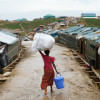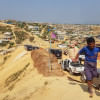Crimes Against Rohingyas: Dhaka unlikely to respond to ICC
Bangladesh is unlikely to send any opinion to the International Criminal Court over exercise of its jurisdiction to investigate the forced deportation of Rohingyas as Myanmar has requested Bangladesh to refrain from responding to ICC's call.
Myanmar conveyed to Bangladesh foreign ministry that the ongoing repatriation process will be affected if Dhaka gets engaged with the ICC, bypassing the bilateral initiative to solve the refugee crisis, diplomatic sources told The Daily Star.
Besides, China, Russia and India have advised Bangladesh to solve the Rohingya problem bilaterally, they added.
Foreign Minister AH Mahmood Ali did not directly respond to the question if Bangladesh is going to send its observations to the ICC.
"We will work protecting the country's interest as well as the interest of Rohingyas,” he said at a press briefing at the foreign ministry on the upcoming visit of Prime Minister Sheikh Hasina to Canada.
“Bangladesh is working for a sustainable and voluntary return of Rohingyas,” he added.
In a letter to Bangladesh on May 9, the international court asked the government to submit written observations by June 11.
Earlier on April 9, ICC prosecutor Fatou Bensouda asked the court to rule on whether it has jurisdiction over the deportation of the Myanmar nationals, a possible crime against humanity.
Over 700,000 Rohingyas crossed over into Bangladesh fleeing a brutal military crackdown since August 25 last year. Thousands of them were reportedly killed, women raped and houses burned in Rakhine State where the community has been deprived of citizenship and other basic rights since 1982.
Bensouda argued that Myanmar is not a party to the ICC but the Rohingyas fled to Bangladesh, which is a member, meaning the court could seek powers of jurisdiction.
Rights activists and legal experts said Bangladesh, which itself suffered for war crimes and crimes against humanity and has set example by trying the perpetrators at home, should support the ICC initiative. Forty-one citizens of the country also made a similar appeal to the government.
Kate Vigneswaran, former ICC prosecutor for the Yugoslavia Tribunal, at a seminar in Dhaka on Monday said Rohingyas have been persecuted for decades, and most of them have been forced to live in Bangladesh, but there has been no effort to hold the Myanmar authorities accountable.
Unless Myanmar is held accountable, the persecution of Rohingyas is not going to end, she said.
“Even if the Bangladesh government does not make a request under article 14, it is open for the prosecutor to act on its initiative under article 15 of the [Rome] Statute to open an investigation into the matter,” said Justice Syed Refaat Ahmed at the High Court Division of Bangladesh Supreme Court at the seminar.
BILATERAL PROCESS STILL NOT WORKING
Amid widespread global pressure, Bangladesh and Myanmar signed a bilateral deal on repatriation of Rohingyas in November.
Dhaka handed over a list of over 8,000 refugees, but Naypyidaw has sent back a list of only some 1,000 “verified” Rohingyas for repatriation. None has been repatriated yet.
Rohingyas want to return to their homes, not to the camps that Myanmar is building now. They also demand guarantee of citizenship and UN-led peacekeepers in Myanmar for ensuring security.
Myanmar says Rohingyas will have to accept the national verification cards (NVC), “which would be the pathway to their citizenship”. Rohingyas, however, say they would be considered illegal migrants from Bangladesh if they accept the NVC.
Professor Imtiaz Ahmed of international relations at Dhaka University said that while Bangladesh can continue the bilateral repatriation process, it can and should support the ICC initiative for holding the perpetrators accountable for a possible genocide.

 For all latest news, follow The Daily Star's Google News channel.
For all latest news, follow The Daily Star's Google News channel. 








Comments